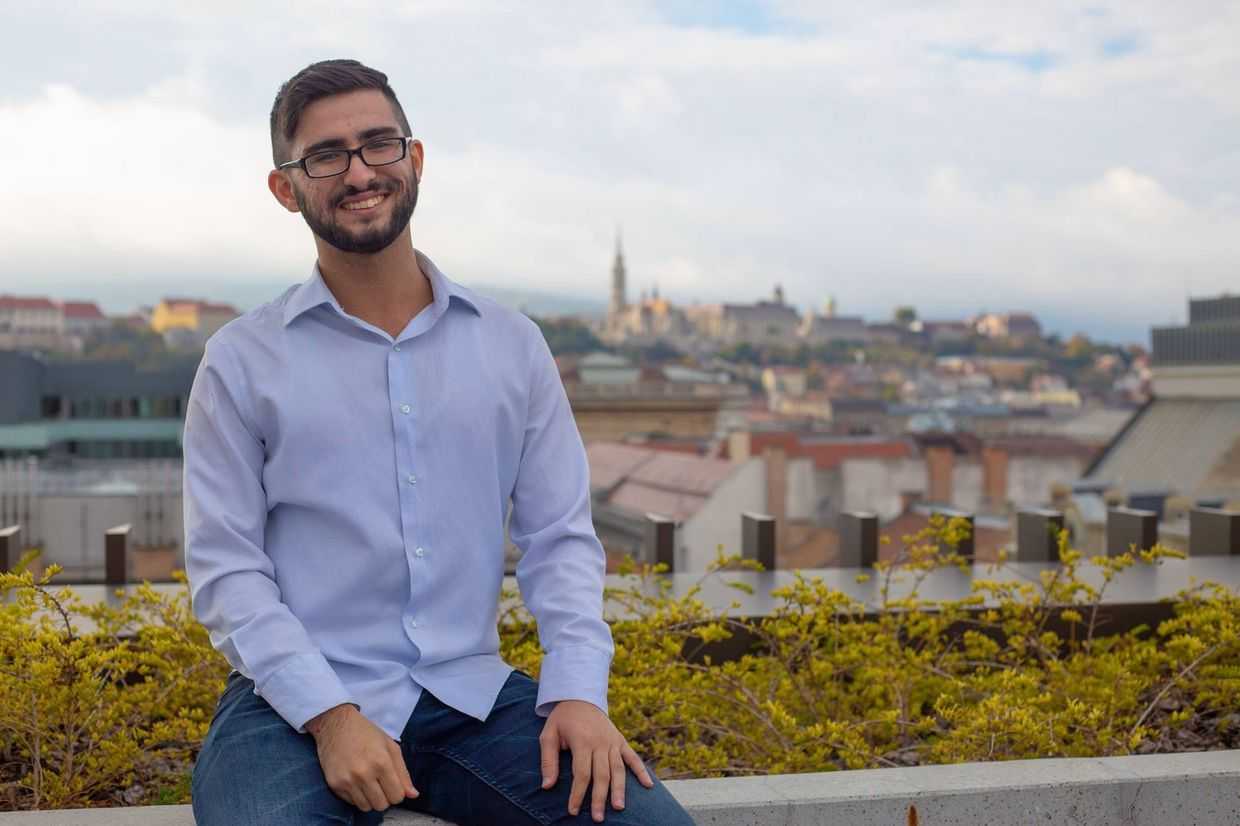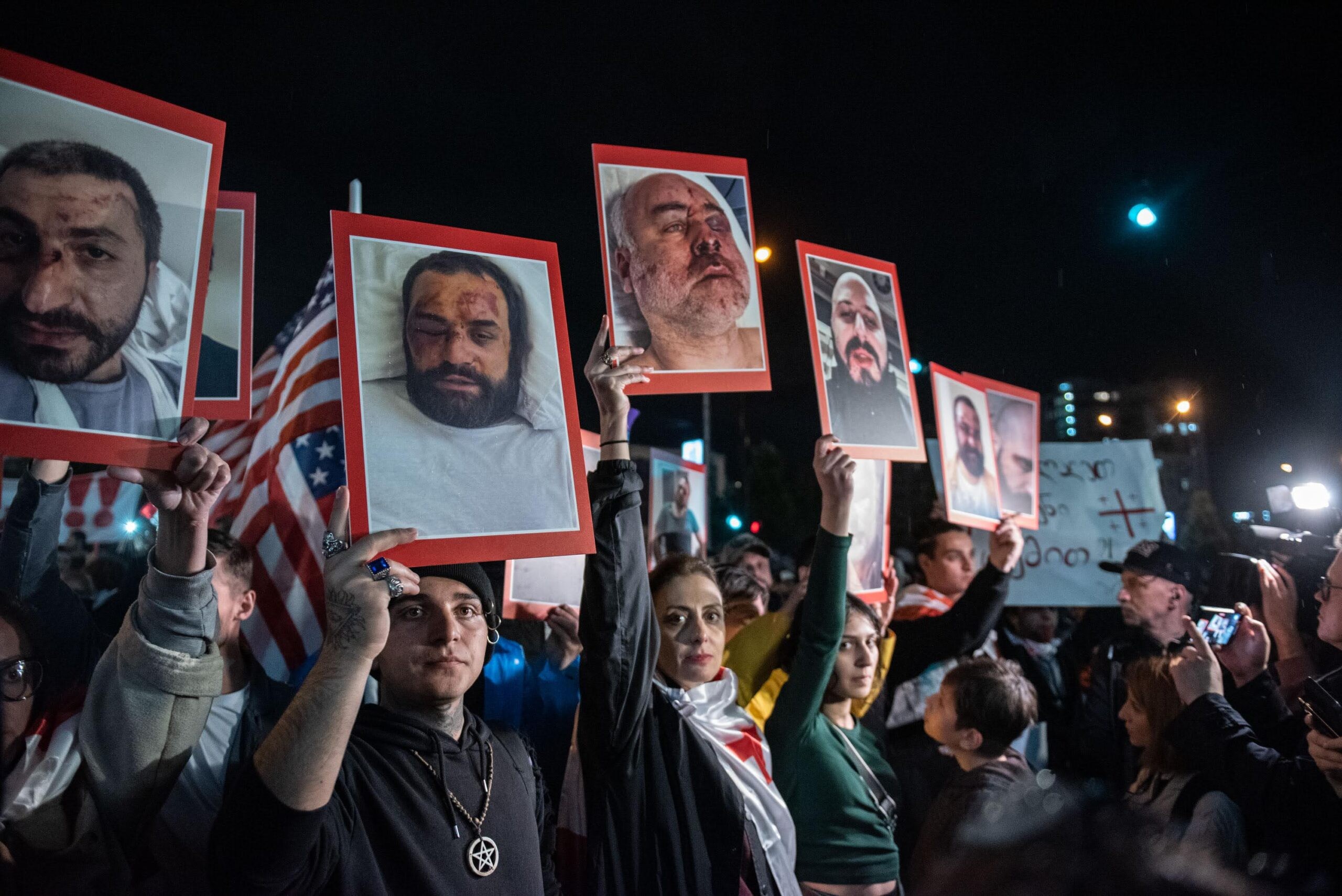
In the months since Georgia’s government revived the foreign agent law, government critics have faced campaigns of harassment and beatings in the streets. Despite calls for those responsible to be held accountable, with some having been publicly identified, none have yet been charged.
On the evening of 8 May, 31-year-old architect Lasha Gvinianidze was returning home after a day of crowdfunding to help a child whose father had been assaulted by masked men at a protest against Georgia’s foreign agent law.
Gvinianidze was one of a group of bikers who have been prominent in street demonstrations against the foreign agent law.
He recalls meeting his friend on his way home, in the neighbourhood they grew up in, when three masked men attacked.
In conversation with OC Media, Gvinianidze describes the attack as clearly impersonal.
‘They were so unfamiliar [to us] and so focused on their task that they didn’t once curse at us during the process’, Gvinianidze recalls.
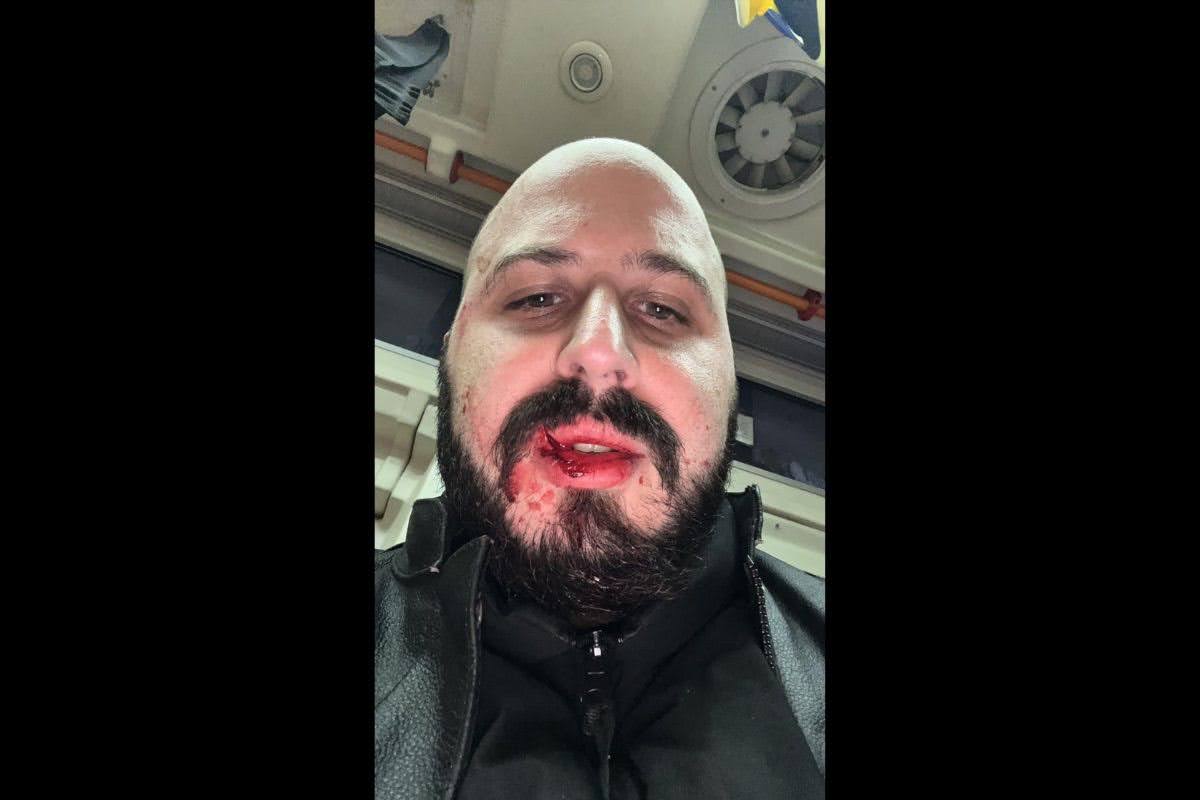
‘It’s ironic’, he adds. ‘We even joked [before being attacked] about what else they could come up with — ambushing people near their homes?’
Gvinianidze is one of at least ten government critics who have experienced similar attacks, while the attackers and those behind the attacks have remained unaccountable.
Footage and leads have been abundant: a number of bystanders filmed men assaulting protesters near Heroes’ Square in Tbilisi, during an anti-government demonstration. But investigative agencies have failed to show any sign of fulfilling their duty, leading many to conclude that they lacked the independence required to do so.
‘They try to sow fear’
There have been several signs that the attacks are coordinated, and facilitated by access to private information.
Luka Shvelidze, a member of the youth wing of the United National Movement (UNM), one of Georgia’s largest opposition parties, told OC Media that he was attacked in the wake of a campaign of intimidation.
‘They used to call me right after I finished my speeches at protest rallies and say, “We just saw you [speak]. Haven’t we warned you to stop?!” And then more threats followed’, Shvelidze recalls.
He is one of many government critics who have reported receiving such phone calls. After the violent attacks on government critics began, he started carrying pepper spray. On 17 May, the precaution proved merited.
‘There were four of them; two showed up and stood in front of me and others behind, big guys with covered faces. I reached for my pepper spray after they asked me if I was Luka Shvelidze, then they attacked, and I started using it’, Shvelidze says. ‘After that, they ran away.’
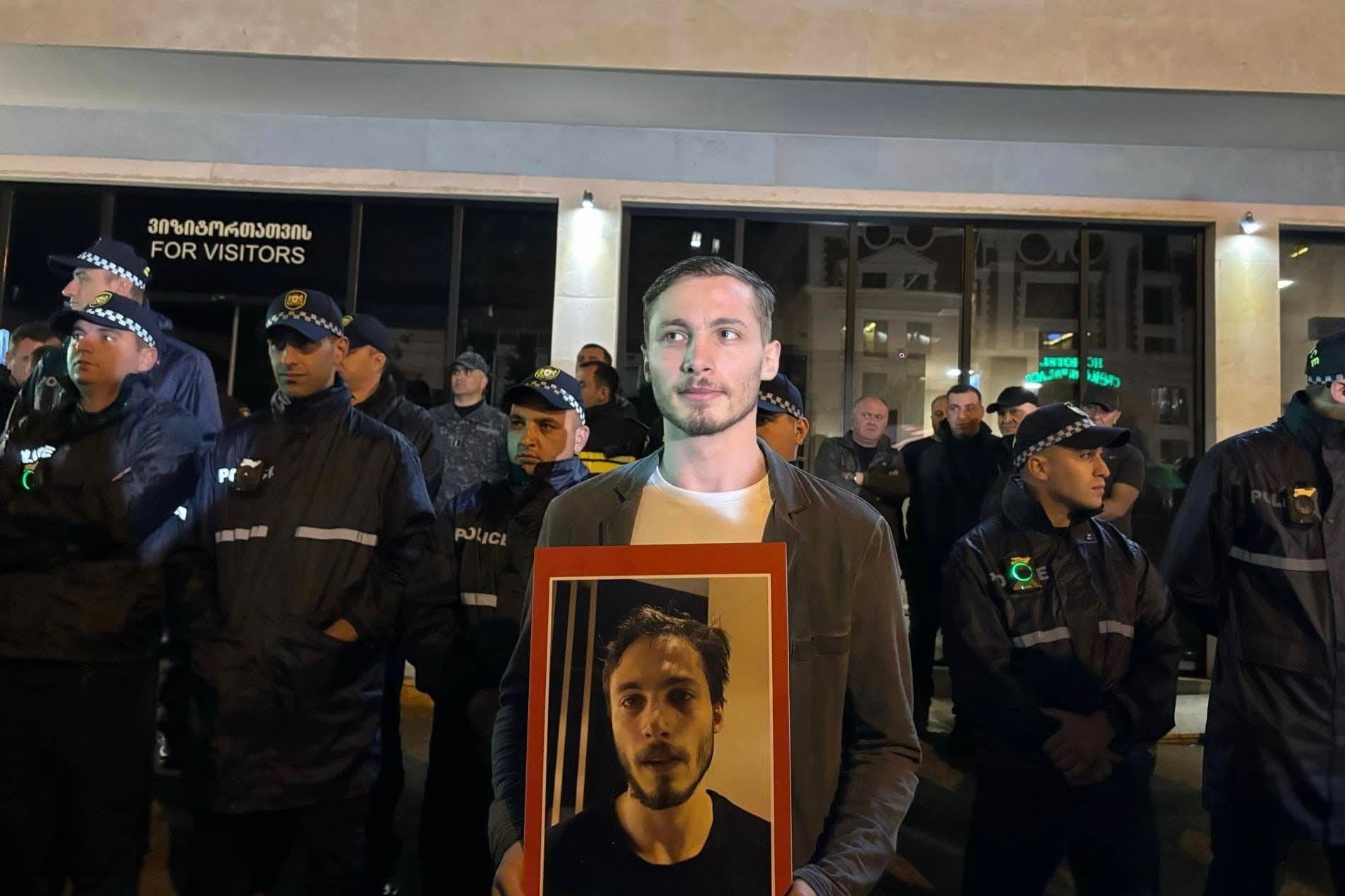
Shvelidze adds that the plan was initially to target rally speakers.
‘They bashed us on the head, so that our injuries would be visible and intimidating to others. After that didn’t work, they started targeting anyone’, he says.
Gvinianidze similarly notes that the attacks were clearly organised, stating that the entire biker group was targeted in various ways.
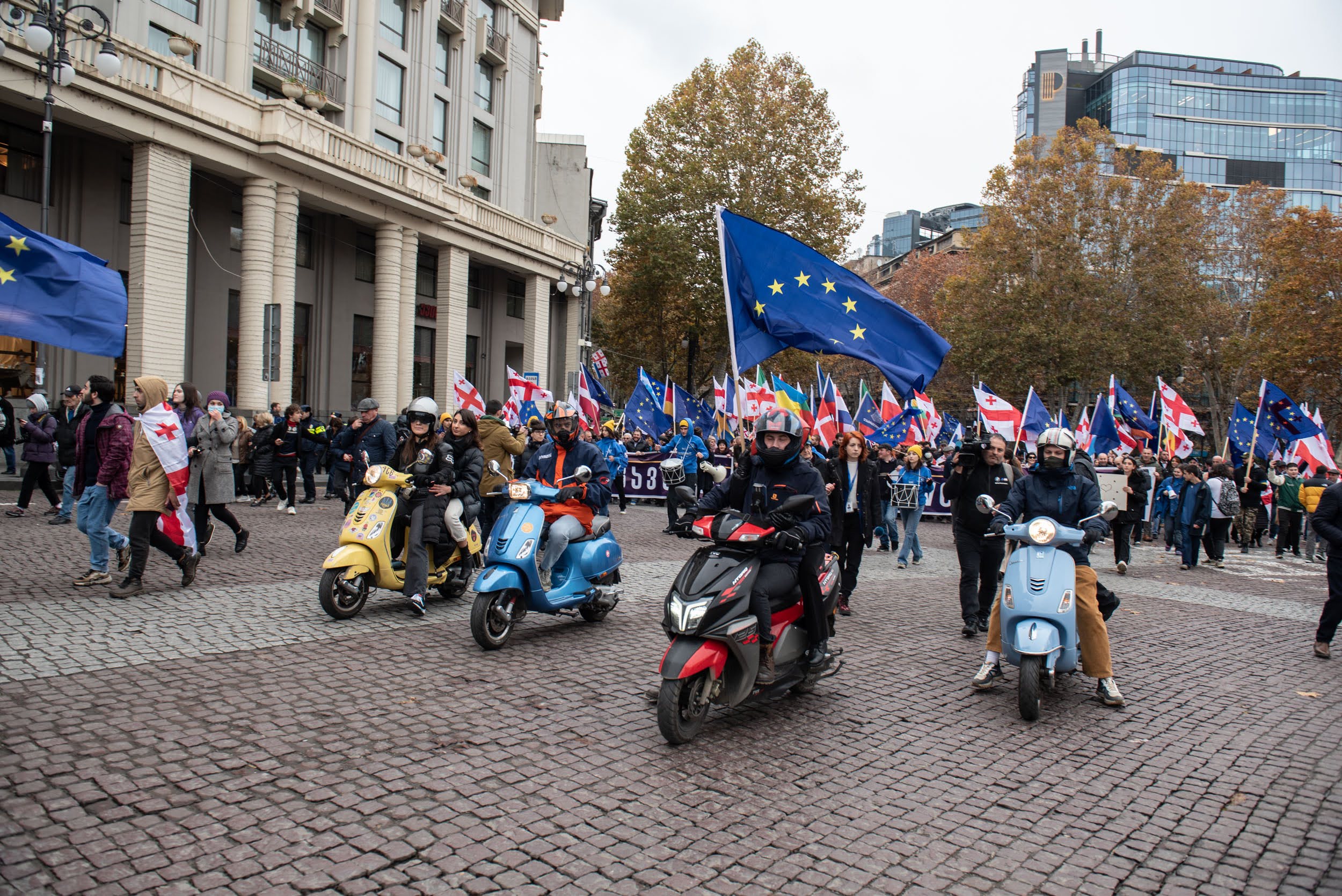
‘They damaged throttle cables, brakes, and motorcycle seats the day after they attacked me’, he says.
‘On another day, an entire hunt was unleashed on the “two-wheeled” ’, he says, describing the reports from bikers that they had been stopped in the street and fined ₾1,000 ($370) by police on the false pretence that they had blocked motorways unlawfully during the protests.
‘The entire point of beating me up was to instil fear in our group’, he adds.
But both Gvinianidze and Shvelidze state that the attempts were fruitless, as people continued to mobilise in the coming days and weeks.
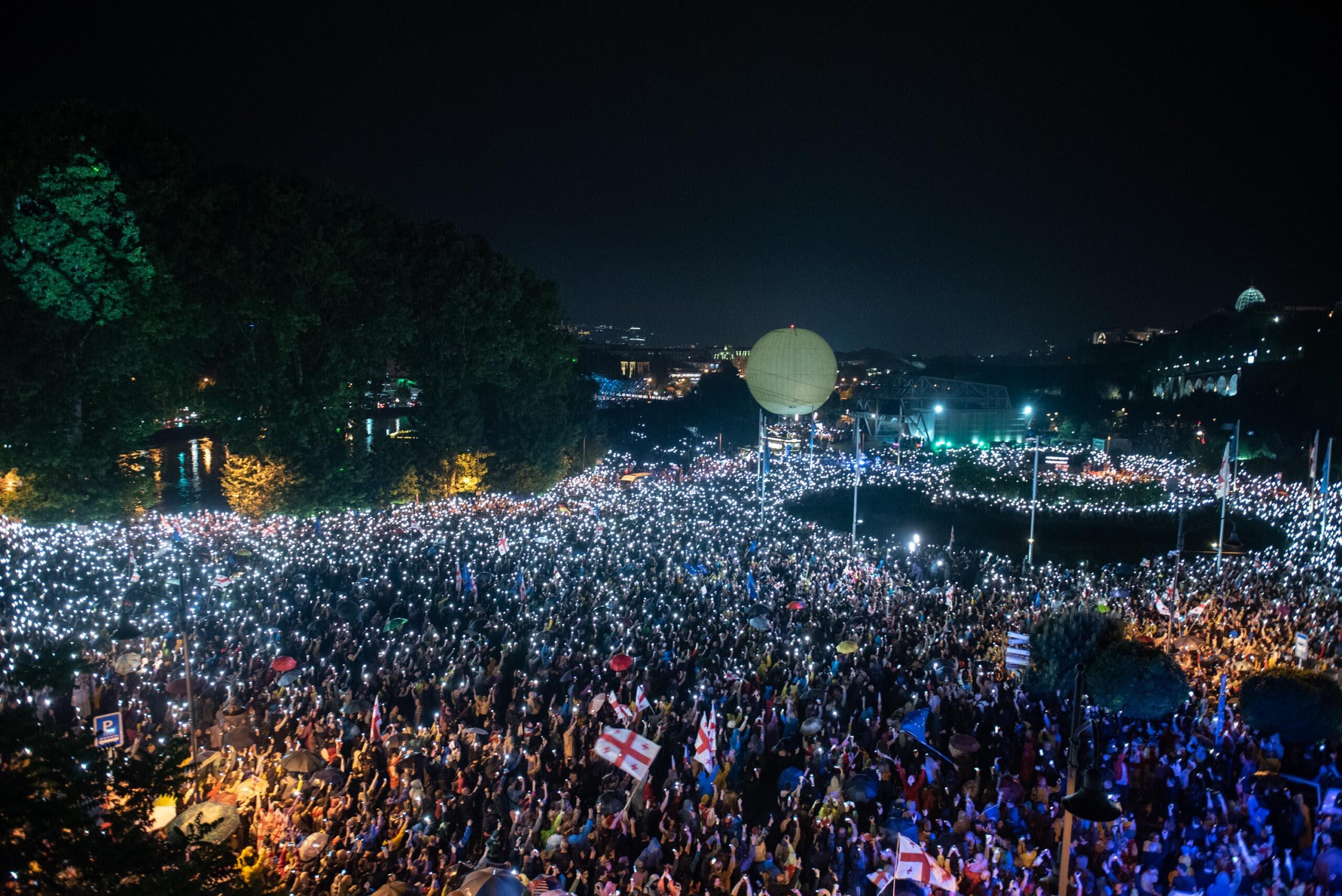
A first wave of attacks
Before the physical attacks began, a campaign of public intimidation was launched.
Early in April, the streets of Tbilisi and other Georgian cities were covered in posters featuring the faces of prominent figures from civil society organisations.
These included people like feminist leader Baia Pataraia, Transparency International — Georgia’s director Eka Gigauri, and former public defender Nino Lomjaria, who also leads the newly formed Georgia’s European Orbit group.
A similar campaign on social media was flagged by Facebook as factually inaccurate.
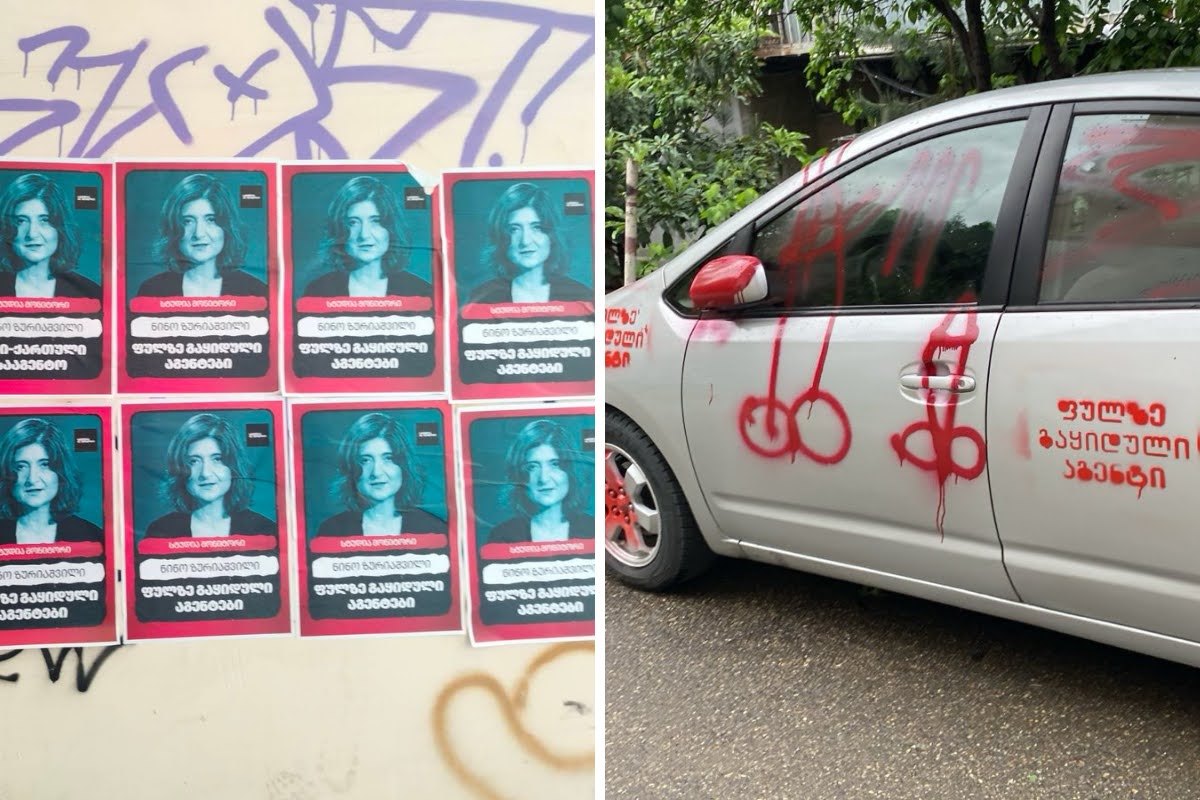
While the government has not officially laid claim to the campaigns, their cross-country coordination and targets led many to conclude that there could only be one body behind them. Echoes of previous election campaigns, in terms of both the style of the posters and the consequences for those who attempted to oppose them, further strengthened that conviction.
On 7 April, a group of activists in Tbilisi, including Nino Liparteliani and Sandro Kinkladze, claimed they were verbally and physically harassed by a group of young men after they started taking down the ‘hate-filled’ posters.
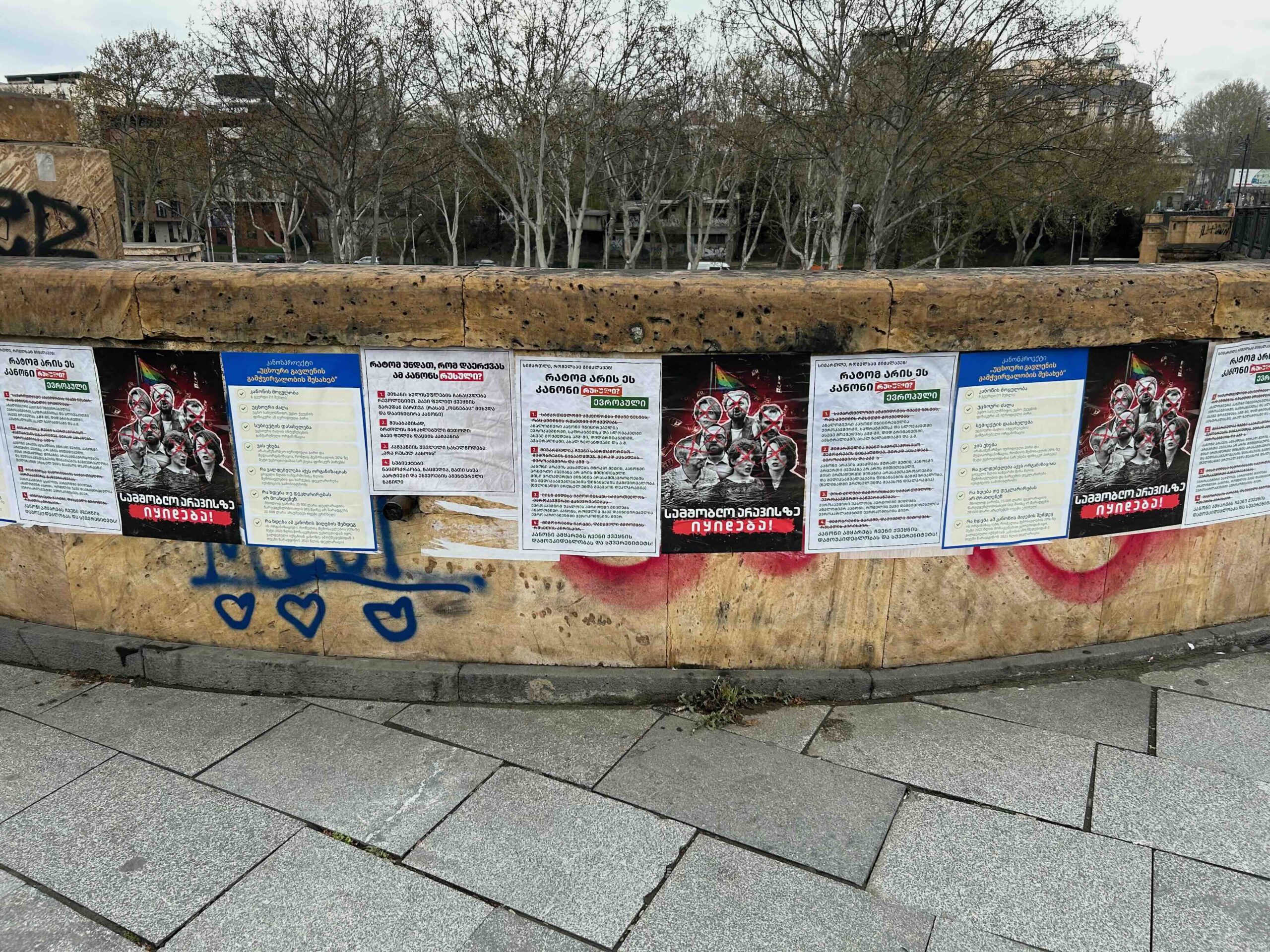
According to lawyer Zviad Getia, police officers who arrived at the site made no arrests and took only the targets of the harassment to the police station to give testimony. Activists corroborated the account.
Liparteliani tells OC Media that she recognised the attackers as members of the Georgian Dream party youth wing.
‘Consequently’, she says, ‘I already knew that they would not face any accountability’.
TV channel Pirveli identified the attackers as Giorgi Shukvani and Nikoloz Melikishvili, reportedly members of the ruling party’s youth wing.
Later that month, a student was reportedly attacked after trying to confront Georgian prime minister Irakli Kobakhidze following a lecture at Tbilisi State University.
After being pushed by a person who appeared to be in Kobakhidze’s security detail, Niko Managadze, Tbilisi State University student and political activist from the For Freedom student group, was physically assaulted by a group of men.
Managadze claimed the attackers, at least 10 of them, were employed by the ruling Georgian Dream party. A similar incident occurred on 25 May, again with no reported arrests.
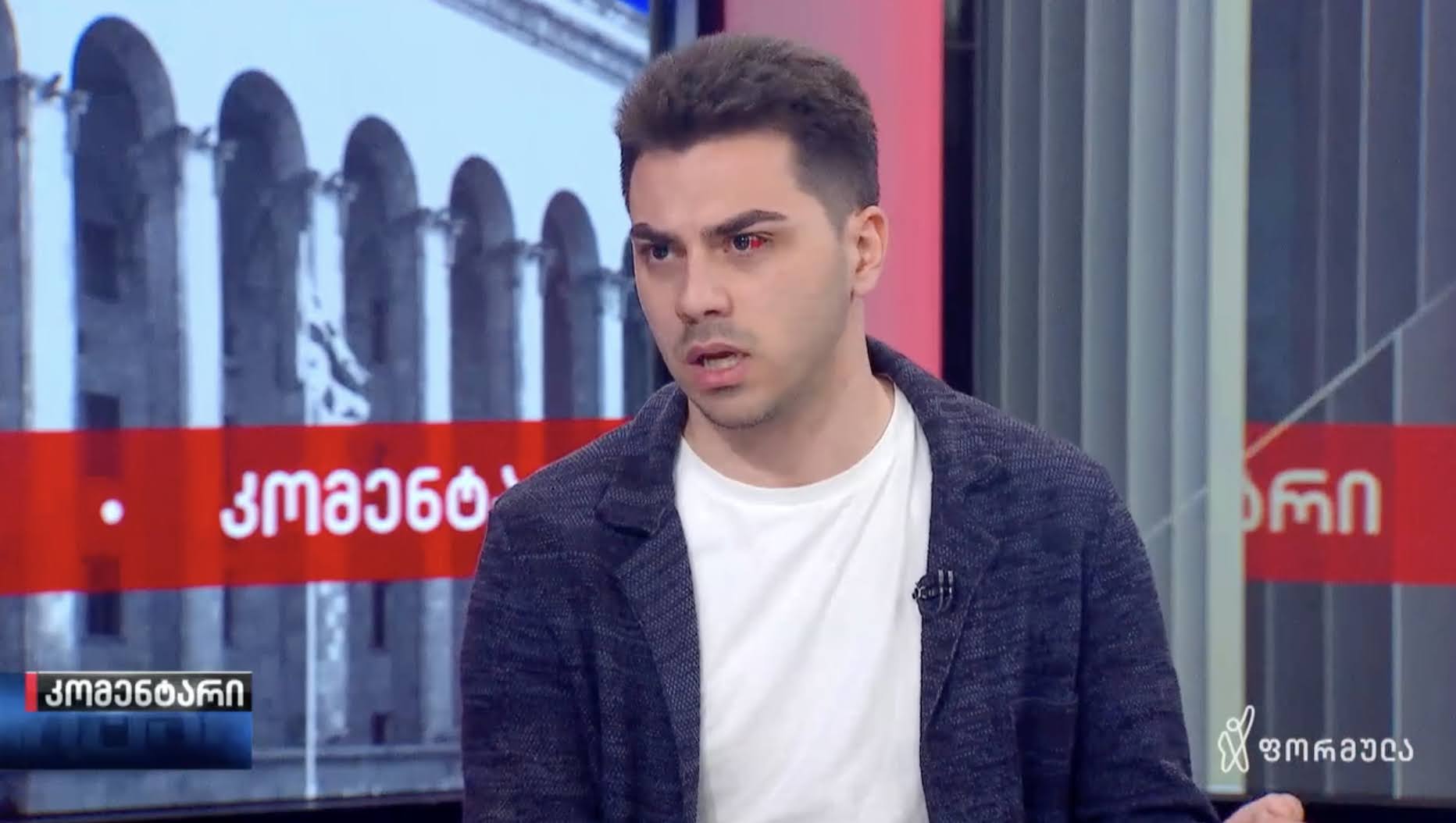
A larger-scale attack took place at the beginning of May, after protesters blocked Heroes’ Square, a central intersection in Tbilisi.
Witnesses report that a dozen attackers emerged from three or four cars that pulled up to the protest, and attacked several protest participants.
The attackers were not wearing masks, and local media both made public their license plates and identified a number of the attackers. Some were allegedly found to have been involved in violent attacks against opposition-organised rallies in previous years.
Nukri Kakulia tells OC Media that after intervening to stop the men attacking protesters, ‘they knocked me down […] and five people started kicking me’.
‘The police never came, despite many people calling them’, Kakulia adds.
He says that despite the attack being widely televised, including alongside interviews in which Kakulia was clearly identified, he was never contacted by the investigative services.
The attacks have also reached outside of the capital.
On 5 May, prominent Georgian teacher and frequent government critic Lado Apkhazava said that three men attacked him and his son near his home in Lanchkhuti, west Georgia.
Apkhazava identified the attackers as local people whose identities were known to him, and claimed he became a target because of his criticism of the government and participation in the demonstrations against the foreign agent law.
Four days later, UNM member Giorgi Mumladze reported that four masked men chased after his vehicle near his home in the village of Tsereteli, Marneuli municipality, aiming to attack him.
‘This is […] a catastrophe. They came to my family for the second time… My children… I can’t even leave them at home anymore’, said Mumladze, while breaking down in a live interview.
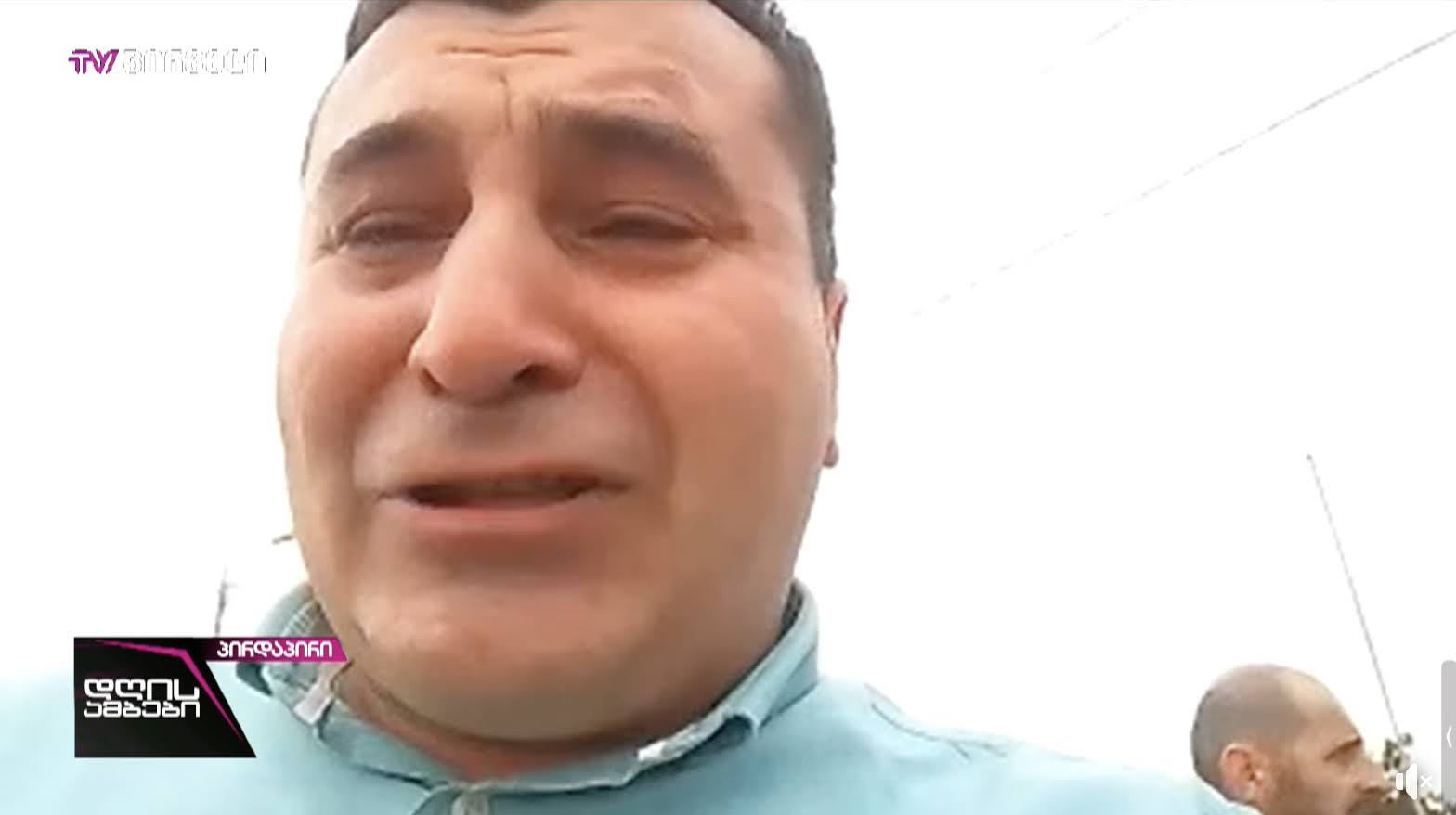
‘Be careful, especially late at night’
As the attacks mounted, Georgian parliamentary speaker Shalva Papuashvili redoubled rhetoric condemning street protests against the foreign agent bill, accusing them of being ‘violent groups’ representing the ‘radical opposition’.
He claimed they were using ‘unlawful’ forms of protest to ‘spread hate’, as well as targeting politicians and other public figures and their family members with ‘threats and blackmail’. So far, investigative agencies have failed to report whether they were looking into the crimes publicly alleged by the country’s third-highest public official.
Papuashvili added that his party was creating a ‘database’ of people involved in or publicly supporting ‘violence, threats, and blackmail’ during the protests against the draft foreign agent law, so that, as he put it, ‘all offences, violence and threats do not go unresponded to by the state or the public’.
[Read more: Georgian Dream to create database of ‘undesirables’]
Attacks on government critics increased in the hours and days that followed, with Gvinianidze amongst the first.
Gvinianidze suspected his location was tracked after he answered a phone call but was met with silence. He also recalls that prior to the attack, an unknown individual called his 72-year-old father and demanded that his son stop protesting against the bill.
‘They showed up 10 minutes after calling me’, he said, insisting that the personal data of the protesters must have been provided by public agencies. This is a sentiment shared by the former Georgian prime minister and current chair of the opposition For Georgia party, Giorgi Gakharia.
‘They are calling young people, including children, first with threats and then curses; and they are doing it to specific numbers, at specific times, specific geolocation’, Gakharia, also a former interior minister, wrote on 9 May. ‘I know very well that without operational support, this is impossible!’
On the night of 8 May, groups of men wearing hoods and medical masks and carrying sticks ambushed Dimitri Chikovani, a member of the United National Movement, and Gia Japaridze, a senior fellow at Georgian think-tank Chavchavadze Centre, and a former diplomat.
Japaridze, who is also the brother of Georgian libertarian politician Zurab Girchi Japaridze, said the attackers demanded to know why he was ‘against the bill’, as they beat him with sticks.
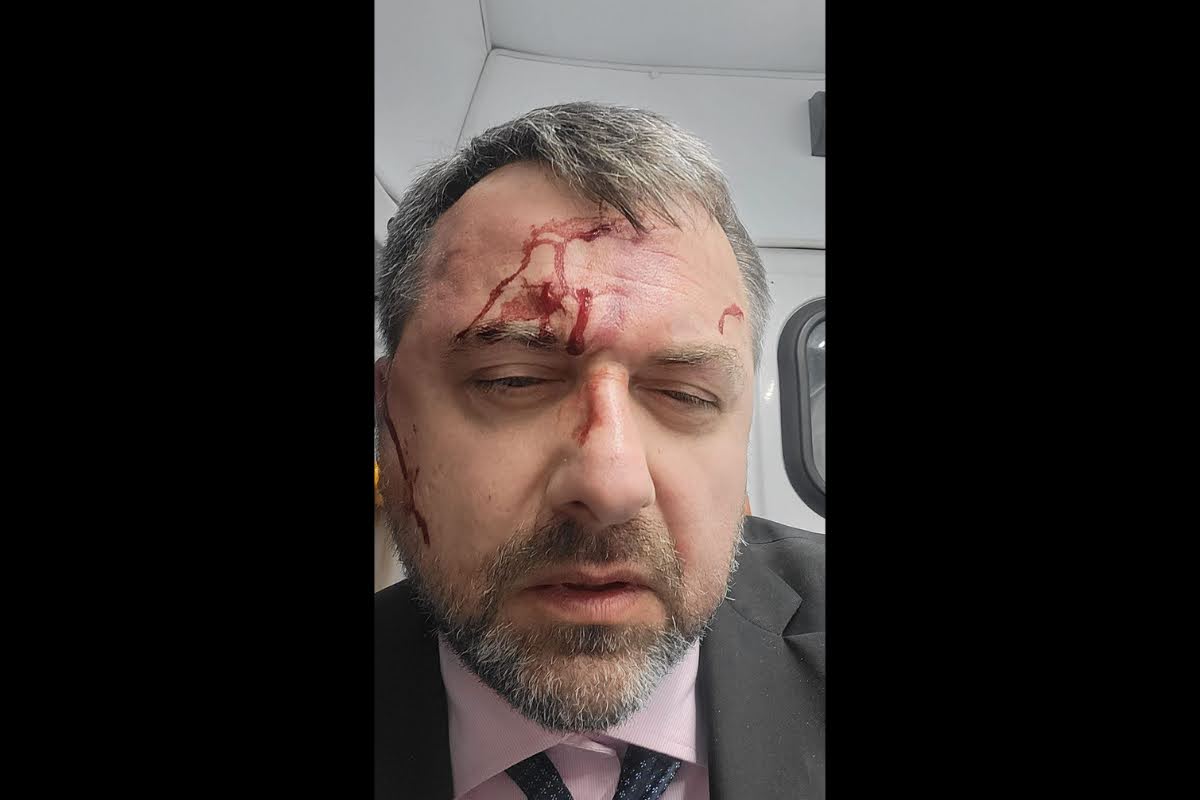
The same night, DJ Giorgi Shengelia, who had actively participated in the protests, published an image on Instagram of his torn t-shirt, captioned ‘I think the times are coming when you have to carry a gun’.
After inquiries, Shengelia clarified that he had been attacked by a group of masked men on the streets in Tbilisi.
‘Be careful, especially late at night, and if you still go out, try not to be alone’, he urged.
At least two opposition party members similarly claimed that they had been attacked by masked men on the night of 8 May, with a third stating that unknown individuals banged on the door and windows of his flat while his 14-year-old son was at home alone.
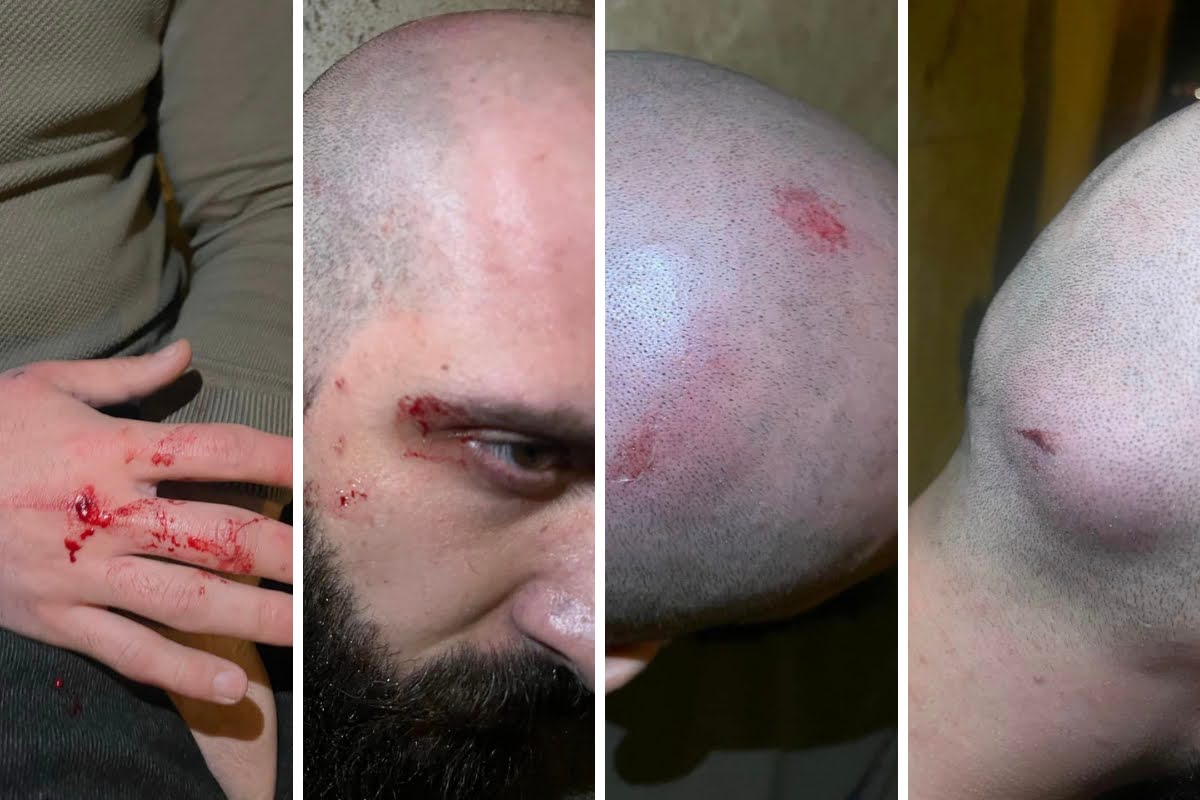
A day later, Zurab Japaridze, the head of the Girchi — More Freedom party, claimed that two masked men had attempted to ambush him, and failed to attack after he fired a warning shot from a pistol he was legally carrying. The Girchi leader also shared photographs of the car’s number plates. Later the same day, he claimed that three more people had attempted to attack him near his home.
Later that week, a member of the youth group organising many of the protests reported that a masked man entered his yard and cursed at him, and an opposition group activist reported that two unmasked men ambushed his brother, who escaped after using pepper spray against them.
More attacks against student and political activists followed in the days after.
On 13 May the Georgian Public Defender urged the authorities to identify the perpetrators of attacks, which he said showed ‘signs of persecution on the grounds of political views, activity, and opinion’.
No such investigation is known to have taken place.
The government responds: ‘I beat scum’
The government’s response has been broadly to ignore the attacks, or condemn their victims.
Following reports that groups of masked men had attacked students attempting to protest Kobakhidze’s lectures, the deputy director of the Interior Ministry’s patrol police department reportedly accused the prime minister’s critics of ‘provoking’ the attacks.
On 10 May, Georgian Dream leaders condemned the violence but made sure to portray the uninvestigated attacks as an inevitable response to ‘violence’ committed by government critics.
The first deputy chair of the parliamentary legal affairs committee, Davit Matikashvili, explained that the violent attacks as stemming from the ‘violence’ practiced by opposition MPs, giving the example of MP Aleko Elisashvili punching parliamentary majority leader Mamuka Mdinaradze on 15 April.
‘I don’t remember anyone being alarmed when NGOs put on their official accounts on social media the images of [parliamentary] majority members, captioned with “83” and the epithets that followed them’, added parliamentary speaker Shalva Papuashvili, referring to government critics compiling a list of 83 ‘traitors’ from the majority who voted for the bill in its final reading.
Some members of the government were more outspoken.
Several hours before Zurab Japaridze reported he had to scare off potential attackers on the street, ruling party MP Dimitri Samkharadze accused him of organising a threatening campaign against his family members and vowed to retaliate and ‘drop’ him dead ‘like a pig’. Samkharadze’s Facebook update later became unavailable.
[Read on OC Media: Georgian Dream MP admits to attacks on NGO and opposition offices]
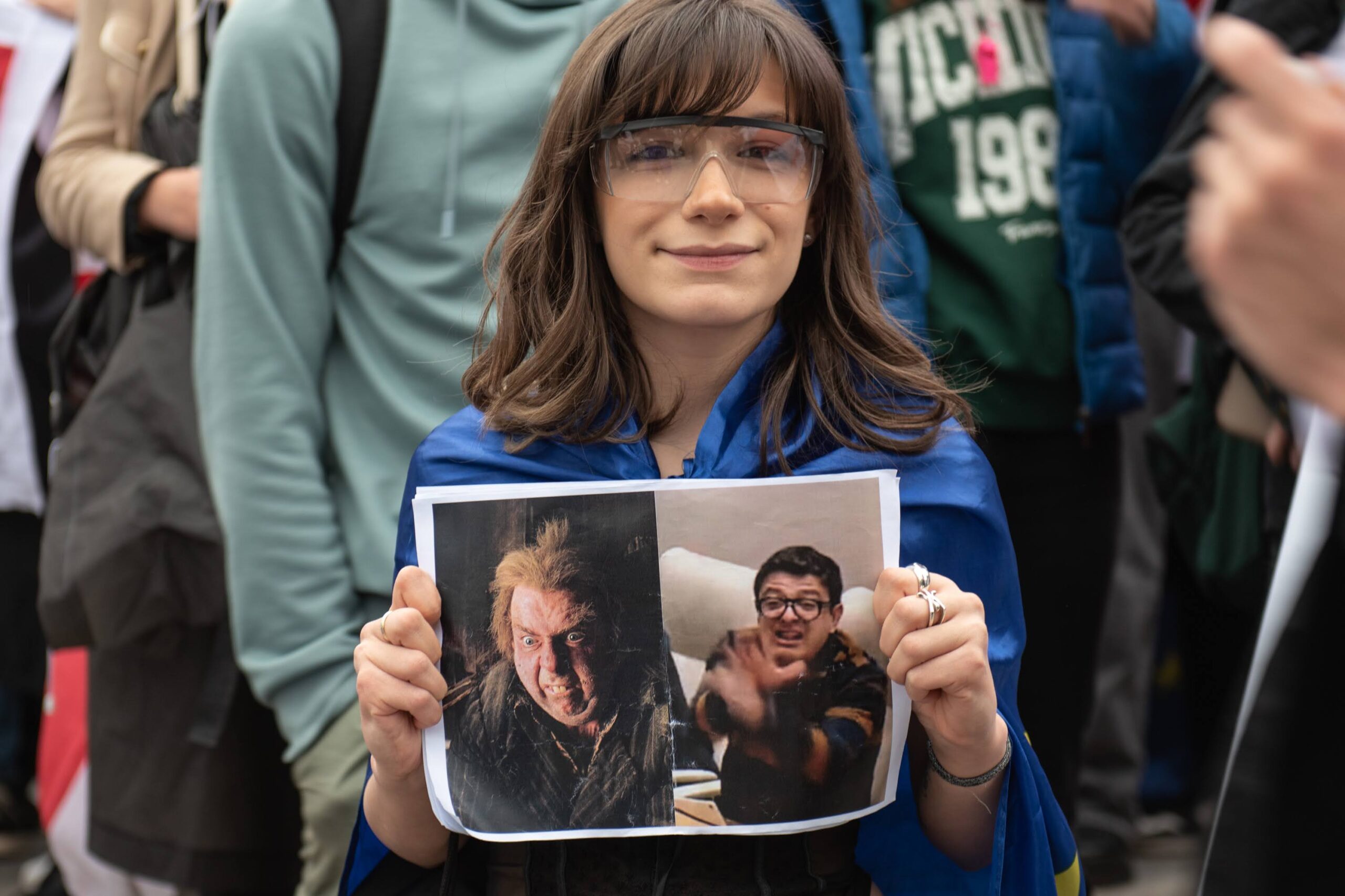
On 28 May, hours before the president’s veto of the foreign agent law was overturned, the head of the Interior Ministry’s Department of Special Tasks responded to a question from TV Pirveli as to whether he was going to beat up young people that day, in light of both attacks on citizens on the streets and reports of police brutality against protesters.
‘I don’t beat up young people, I beat up scum’, replied Zviad ‘Khareba’ Kharazishvili.
‘They’re out of options. We’re a different generation’
On the day that parliament made its final vote to pass the foreign agent law, Luka Shvelidze stood outside parliament amidst a crowd of thousands thrumming with the sound of chants, whistles, and vuvuzelas.
‘Georgian Dream have failed immensely, because I’m still here at the rally’, said Shvelidze, insisting that the attacks had changed nothing. ‘What worse can they do? They are robbing us of our homeland and dragging it to Russia!’
He added that government conspiracies theories about a ‘global party of war’, and supposed organisations standing behind protesters had failed to scare the public.
‘They’re out of options. The tactics they used to resort to — blackmail, slander, ambushing people near their houses — they don’t work on us. We’re a different generation’.
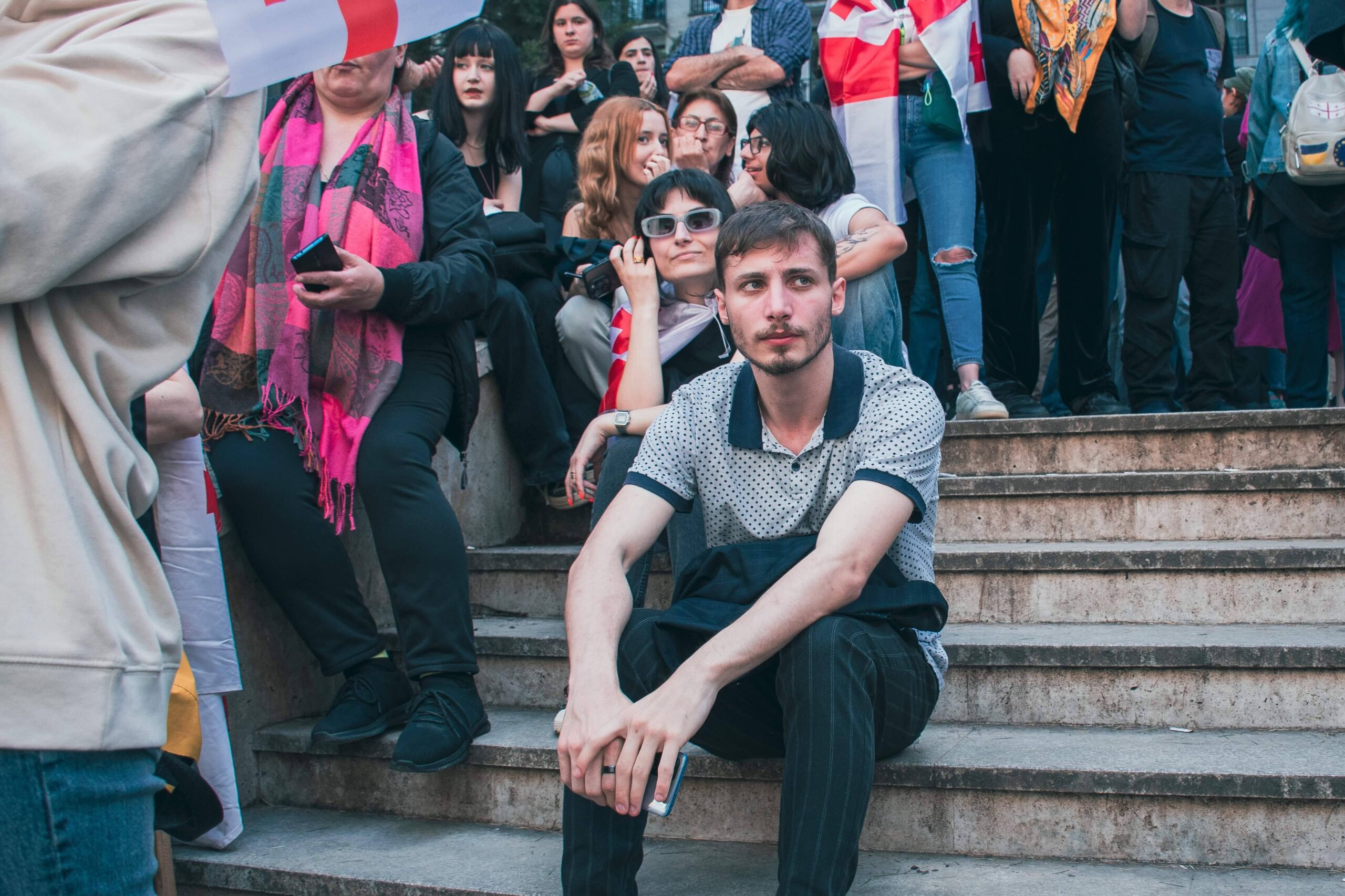
Hours after his comments, the ruling party overturned the president’s veto of the law, demonstrating that while those outside protesting had new attitudes, the government’s attitudes towards its people had changed too.
Days later, opposition parties and civil society activists reported a fresh wave of threatening phone calls, as well as of their buildings being defaced.
On 2 June, Girchi — More Freedom member Tsotsne Koberidze published footage of two men attacking him, one with a taser. On the same day, Mariam Sitchinava of the Droa party in Zugdidi also reported being attacked, not long after dozens of masked men ransacked the UNM offices in Tbilisi in the middle of the night.
‘Fifty-five hours have passed since the bandit attack, and no one has been questioned, no one has been detained’, noted UNM’s Lasha Parulava on 3 June.
With no investigation apparent, many see the wave of intimidation as set to continue.



